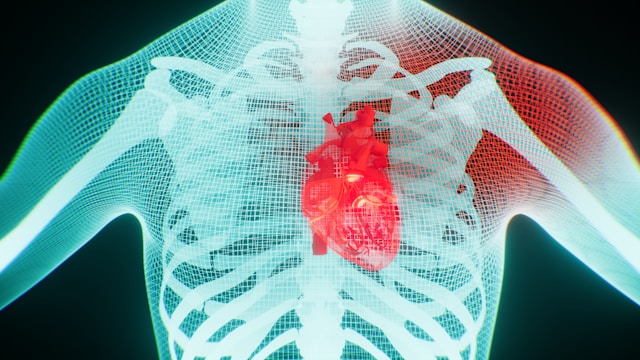First, a disclaimer. I am not a doctor or medical practitioner of any kind. I can barely open a Band-Aid without help. So do not take this post as medical advice. Go see an actual doctor.
I come from a family of hoarders. But instead of hoarding old vinyl records or knick-knacks, we gather and collect cholesterol like it’s on sale at Walmart. Instead of buying it, hereditary high cholesterol was a gift passed down to me. You might say it’s my inheritance.
This fun trick of nature is called familial hypercholesterolemia (FH). FH is an inherited disorder that makes it harder for your body to remove low-density lipoprotein (LDL) cholesterol from your blood. And if you don’t already know, that’s what leads to heart disease.
Of course I’ve known about this for years, watching grandparents, uncles, aunts, and my father suffer the aftermath of multiple heart attacks and surgeries. It’s not a future I looked forward to. But when you’re young you think it can never happen to you, and when you’re young it mostly doesn’t. But I know that I’m not going to live forever, and now that I’m in my 50s (when did that happen, anyway) I feel a much stronger urge to stay vigilant.
Rather than just hoping I’m okay, I’ve been getting regular checkups for the last several years. Some of the results I’ve been pleasantly surprised with and others it’s tempting to clap my hands over my years and chant na-na-na-na-na-na-na-na I can’t hear you. But ultimately I listened and took action.
First, in a checkup in 2021, my blood pressure was what they call “borderline high.” Not high, just… borderline. Enough for mild concern. Here are some of my other numbers from that time:
| Test | Result | Reference | Result |
|---|---|---|---|
| Cholesterol | 223 | <200 | High |
| LDL | 145 | <130 | High |
| HDL | 54 | >40 | Normal |
| Triglycerides | 121 | 40-160 | Normal |
I was shocked at my cholesterol numbers, and I’ll tell you why: I eat a strict vegan diet. I have been eating 100% plant-based since 2001. In case you’re not sure what that means exactly, I don’t eat any animal products whatsoever. Yes, that includes not eating seafood (animals), or eggs, or dairy — which come from animals. I’ll get to what I do eat in a moment. For now, please share my shock and dismay. I was totally bummed, I thought I had been doing so well, which is why it pays to get checked out.
What the doctor said
After sharing my disappointing numbers with me, and knowing about my vegan diet, my doctor had suggestions:
- Cut down on alcohol
- Exercise more
- Cut down on oil
- Take blood pressure medication
- Take blood thinners
- Start eating some fish, or take fish oil capsules
- Take Vitamin D regularly
Right off the bat, I felt like I could definitely take on the first three recommendations. Cool, I’m on it. About numbers 4 and 5 I was extremely hesitant, particularly when she casually mentioned that she typically prescribes those drugs for most people my age anyway. It’s almost like she knew the exact words to say to make me challenge the very idea. Number six was a total deal breaker. There was no way I was going to start eating fish or a product of fish. Not happening. But Vitamin D, sure.
With a sigh, she acknowledged my concerns and we compromised on a plan.
What I actually did
First of all, I realize that I could drink less alcohol. I don’t often get drunk or suffer hangovers, but sure, I could cut back if it will help my heart. I suppose I could just stop altogether, but I felt like we weren’t there yet.
Exercise was an easy one. I realized that even though working in my screen printing shop counted as regular physical activity, I needed to do something more focused like walking and running. So I started a walking/running program that got me moving at least three times per week, plus doing some old yoga stretching and strengthening poses. I had to dust off my brain to recall them, but there they were.
As for the fish, what was really needed was an uptake in Omega-3 fatty acids. Most people get this from fish, but it’s also found in walnuts, chia seeds and flax meal. These days I put a tablespoon of flax meal in my morning porridge.
We agreed that I would forgo the medications for a year and see if changing my lifestyle habits would do the trick. Cool.
How it’s going
It’s now 2025, and I’ve been getting (mostly) regular checkups in the five years since that disappointing doctor visit. I’ve kept up the diet and exercise changes as well.
Since then, things have improved significantly. For one, my blood pressure is fine these days, not even borderline high. As for my blood levels, here are the results from today:
| Test | Result | Reference | Result |
|---|---|---|---|
| Cholesterol | 176 | <200 | Normal |
| LDL | 105 | <130 | Near-Optimal |
| HDL | 46 | >40 | Normal |
| Triglycerides | 125 | 40-160 | Normal |
To this day I still haven’t taken any medication for my blood pressure or to lower my cholesterol. These numbers look much better. Unfortunately, I moved out of state and have a different doctor, so I won’t get the satisfaction of seeing her reaction to the change.
It’s extremely gratifying. My genetic predisposition to hoarding cholesterol usually means my LDL levels will stay up no matter what I eat. However, I managed to dramatically change my hereditary high cholesterol with diet and exercise alone. I should probably mention that I don’t smoke, use any kind of tobacco, or vape, which are also contributing factors to heart disease.
Why doesn’t everyone do this?
I don’t mean to get on a high horse here. I’m not one of those scary, militant vegans who goes around shaming people for eating animal products. I don’t carry around buckets of red paint or post pictures of slaughterhouses in my Instagram feed. I just choose to eat my way.
However, I do think that if someone is given the choice of managing heart disease through diet and exercise alone and they refuse, it’s a lot weirder than being vegan.
This is also one of those things I’m passing down to my kids. Yes, I have bequeathed the heart disease genes, but I am also giving them the tools to keep it at bay.


Leave a Reply